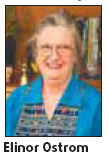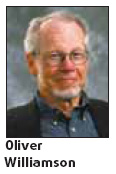
|
WORLD> America
 |
|
Nobel economics winners shocked and gratified
(China Daily)
Updated: 2009-10-13 08:46 STOCKHOLM: A US professor who showed how common property might be more successfully managed became the first woman to win the Nobel Prize for economics yesterday, sharing this year's award with an American expert on conflict resolution.
 Elinor Ostrom defied conventional wisdom with her studies that showed user-managed common property - such as fish stocks and woodland areas - more often than not were better run than standard theories supposed. The previously accepted view was that such common property was poorly managed and would be better off either regulated centrally or privatized. Ostrom, 76, became the fifth woman to win a Nobel award this year - a record for the prestigious honors. The Royal Swedish Academy of Sciences awarded her half the 10 million Swedish crown ($1.4 million) prize, with the other half going to fellow winner Oliver Williamson, who was recognized for his analysis of conflict resolution. "Over the last three decades, these seminal contributions have advanced economic governance research from the fringe to the forefront of scientific attention," the committee said in its statement. Indiana University Professor Ostrom, who participated by telephone in a news conference, said her first reaction was "great surprise and appreciation". "There are many, many people who have struggled mightily, and to be chosen for this prize is a great honor and I'm still a little bit in shock," she said.
 Williamson, 77, of University of California, Berkeley, said he was "gratified" to receive the honor. "One of the benefits, I think, that will accrue, or at least I hope will accrue, is that organizations will play a more prominent role in the study of economic activity in the near future," he said. According to Williamson's theory, "large private corporations exist primarily because they are efficient. They are established because they make owners, workers, suppliers, and customers better off than they would be under alternative institutional arrangements," the academy said. "When corporations fail to deliver efficiency gains, their existence will be called in question," it added.
But based on Williamson's findings, it would be better to regulate such behavior directly than with policies that restrict the size of corporations, the academy said. It said Ostrom and Williamson helped explain that economic analysis can shed light on most forms of social organization. "Economic transactions take place not only in markets, but also within firms, associations, households and agencies. Whereas economic theory has comprehensively illuminated the virtues and limitations of markets, it has traditionally paid less attention to other institutional arrangements," it said. The economics prize was established in 1968. It was not part of the original group of awards set out in dynamite tycoon Alfred Nobel's 1895 will. This year was an exceptionally strong one for the United States, with 11 American citizens - some of them holding dual nationality - among the 13 Nobel winners. US President Barack Obama won the Nobel Peace Prize on Friday. Reuters - AP |